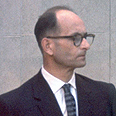
Eichmann trial veterans reunite
Men who captured, investigated and prosecuted Nazi criminal revisit landmark trial that brought to light horrors of final solution to rid Europe of its Jews
Fifty years after Nazi criminal Adolf Eichmann was brought to justice, the men who captured, investigated and prosecuted the Holocaust mastermind held a rare reunion Thursday in the Jerusalem hall where his famous trial took place.
The gathering, marking the United Nations' annual Holocaust Remembrance Day, revisited the landmark trial that brought to light in vivid detail the horrors of the Nazi final solution to rid Europe of its Jews.
The 1961 trial, in which Eichmann sat inside a bulletproof glass booth and calmly listened to the testimonies of some who survived his efforts to kill them, was a watershed moment for the young state of Israel.
Until they heard gripping public testimony of Jews who survived extreme torture and deprivation, many Israelis looked down on the survivors as weak victims, at odds with the macho image of the "new Jew" of Israel. The emotional descriptions of the horrors they survived changed the perception for many and allowed more survivors to go public with their lingering pain.
It also opened Israeli minds to stories of underground Jewish resistance fighters and doomed but courageous ghetto uprisings.
Six million Jews were killed by the German Nazis and their collaborators during World War II, many of them following Eichmann's blueprint for liquidating the entire Jewish population of Europe.
"This trial told the story of what really happened to the Jewish people. If it weren't for the trial, people wouldn't be talking about six million today," said Menachem Resch, a retired police detective who was on the special task force that questioned Eichmann.

Thursday's event at trial's venue (Photo: Yossi Zamir)
The event brought together an aging fraternity of spies, police detectives, lawyers and witnesses who all played a part in bringing the infamous Nazi leader to trial. The daring agents who captured Eichmann are now well into their 80s and needed assistance climbing the stairs to the stage of the Gerard Behar Center – a Jerusalem auditorium that served as the trial's venue.
Those who took the stand against Eichmann said their testimony made its mark on history.
"I'm glad I did it so that people will not forget. The memory is very important to the Jewish people," said Avraham Aviel, 82, who testified about surviving a firing squad before a death pit in Poland. "The trial is a reminder of the past and can serve as an example to prevent tragedies in the future."
Polite and calm
Eichmann, a top deputy of Adolf Hitler, is known as the "architect of the Holocaust" for his role in coordinating the Nazi genocide policy. He attended the Wannsee Conference where Nazi leaders drafted the "Final solution to the Jewish question."
After the war, Eichmann escaped to Argentina. In May 1960, after extensive surveillance, Israeli Mossad agents nabbed him there.
Rafi Eitan, the head of the operation, recounted how he and fellow agents shoved Eichmann into a car and spirited him to a safe house. In the back seat of the car, Eitan searched Eichmann's body for distinctive SS scars on his arm and stomach. "And once I felt it I was convinced. This is the man - we got Eichmann," he said during a panel discussion at the reunion.
The team awaited in Argentina for six days before an El Al plane whisked Eichmann to Israel.
Avraham Shalom, later a Shin Bet security service chief, was also part of the capture team. He said Eichmann was polite and calm.
"To think that this was a man who treated humans like nails or pieces of stone was unexplainable. It is still inexplicable ..." he said, his voice choking with emotion.
Eichmann was found guilty on 15 criminal charges, including crimes against humanity and crimes against the Jewish people. He was hanged the following year at an Israeli prison, the only time Israel has carried out a death sentence.
Gabriel Bach, who later became a Supreme Court justice, was the deputy prosecutor in the case. He said he met Eichmann after reading the autobiography of Hitler deputy Rudolf Hess, who described how Eichmann chastised him for hesitating to order the shooting of 1,000 Jewish children. Eichmann explained that there was no point in killing the adults and sparing children who could repopulate the race in the future.
"Obviously, it was not easy to remain calm in the face of such a man," Bach recalled.
In 2005, the United Nations designated January 27 as International Holocaust Remembrance Day, marking 60 years to the liberation of the Auschwitz death camp. The Eichmann trial reunion was meant to coincide with the various events taking place Thursday worldwide.
Israel marks its annual Holocaust memorial day in the spring, according to the Hebrew date of the Warsaw ghetto uprising.
- Follow Ynetnews on Facebook










